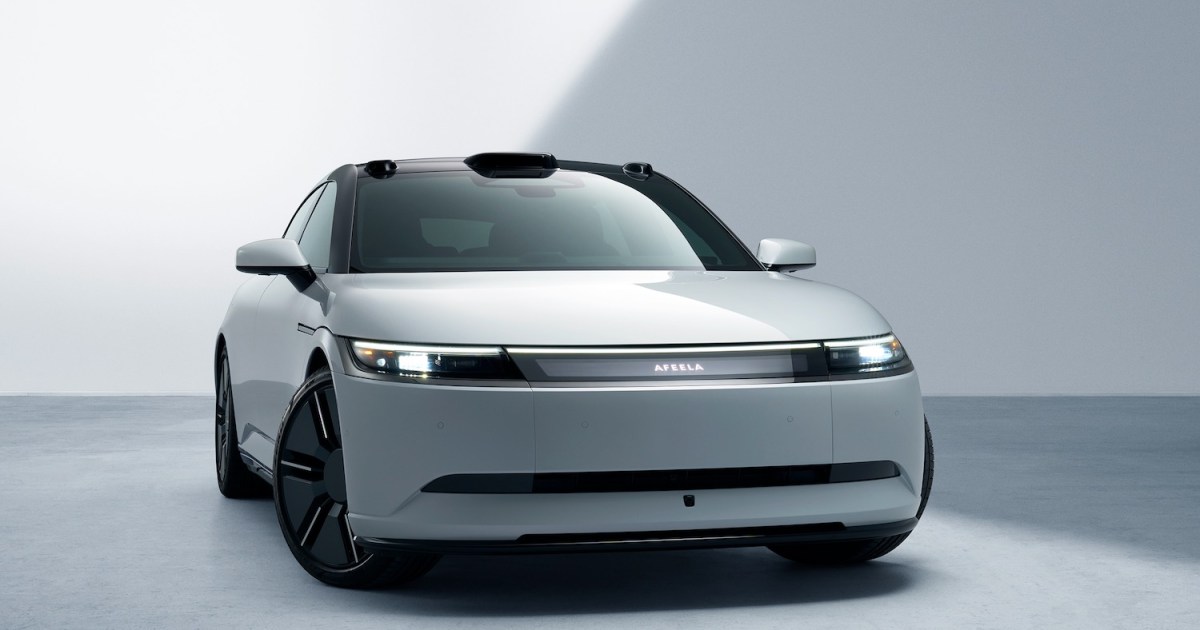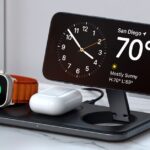The Sony car is almost here. After its creation via a joint venture with Honda in 2022 and two years’ worth of prototypes, the electronics giant’s Afeela brand is finally taking reservations for its first electric vehicle, with deliveries scheduled to start in 2026.
But will it be worth the wait? Coinciding with the opening of reservations, Sony Honda Mobility brought updated prototypes of the Afeela 1 (as it’s now officially known) to CES 2025, representing what California customers (Afeela is only taking reservations in that state) who put down a $200 refundable deposit can expect when they take delivery.
This gave me the opportunity to finally sit behind the wheel of the Afeela 1, and while I wasn’t able to drive it out of Afeela’s booth in the cavernous Las Vegas Convention Center, I did get to experience some of the tech features that are really supposed to set this car apart from other EVs. But that still left a lot of questions.
Tech-savvy design remains unchanged
In contrast to the many startups that have cannonballed into the EV pool in the wake of Tesla, Sony has taken a slow and methodical approach to launching its first car. It announced that intention at CES 2020 with the Vision S concept, an electric sedan much like the Afeela 1. It followed that up with the Vision S-02, an SUV, before teaming up with Honda and then announcing the Afeela brand at CES 2023.
That makes this the third time Afeela has shown the car it plans to sell at CES, although 2023’s version was more like a concept car, with a broad-strokes indication of the design direction and planned features. Afeela brought a more refined version to CES 2024, and made few apparent changes to the version shown at CES this year.
The near-production-ready version maintains a rounded, computer-mouse shape.
The near-production-ready version sitting under spotlights and behind ropes at CES 2025 maintains the rounded, computer-mouse shape Afeela has used all along. It also retains the “media bar,” a projection surface where the grille would normally be that lets drivers display cutesy messages like “Have a nice day” or PlayStation video-game wallpaper, as well as a bump in the center of the roof for a lidar unit. However, it’s now flanked by two cameras angled to either side for maximum field of view. They’re among 40 sensors for the Afeela’s driver-assist features.
Inside, it’s hard to spot any differences from last year’s prototype. The screen spans the dashboard and spills onto the doors. It’s mounted high to keep it closer to the driver’s line of sight, and Afeela employed a yoke-shaped steering wheel to further maximize visibility.
Interior is still just a screen and a steering wheel

It’s now safe to say that this really is the setup Afeela plans to go to production with, and at first glance it has some good points. I found it easy to glance at even the far-right parts of the screen without tilting my head down or to the side, which explains why this design is being adopted not just by Afeela but by traditional automakers. Ford’s version debuted on the 2024 Lincoln Nautilus luxury SUV, and BMW announced its Panoramic iDrive display for future EVs at this year’s CES.
Like Ford and BMW, Afeela plans to offer in-vehicle video streaming and gaming — but with Sony content. You can even bring along your PlayStation controller and play Ghost of Tsushima or Gran Turismo while you wait for your car to charge.
The screen is the only premium-feeling thing in this nearly $90,000 car.
The Afeela 1 cabin also feels like it was designed around the screen. It’s the only premium-feeling thing in this nearly $90,000 car, with impressive graphics and a bezel-less design that minimizes the split between the different segments of the display. That contrasts a cabin that otherwise has no points of interest.
The dashboard display also has small winglets that project video from exterior cameras. Automakers like Audi have been trying to bring this tech to the U.S. for years, mainly for the aerodynamic benefit of replacing drag-inducing side mirrors with small camera pods, but have faced regulatory roadblocks. But Afeela just kept the conventional mirrors, sidestepping those issues, but also making the cameras unnecessary.
UX is TBD

The interior really comes alive once you start engaging with some of the features on the screen. Changing the background also changes the ambient lighting, and an audio system utilizing Sony 360 Spatial Sound Technologies produces an impressive 3D effect whether you’re listening to streaming audio or watching anime on Crunchyroll. I did a bit of both with in-car apps that didn’t require connecting a phone.
What I couldn’t do was get a good sense of how well the car’s voice assistant worked because it, well, didn’t. That, along with a navigation system that refused to load, were reminders that the cars Afeela brought to CES 2025 are still prototypes.
This was particularly inopportune, because without any demonstration of different features or better comprehension, Afeela’s voice assistant appears similar to what’s already available from Audi, BMW, Lexus, and Mercedes-Benz. Like those features, it’s designed to help drivers access basic vehicle functions, while responding to commands in a conversant manner. Unless it proves vastly superior in production cars, this won’t be much of a distinguisher from established brands.
Driver assist could make the difference

It’s a similar story with the advanced driver-assistance system Sony designed for this car. This will be one of the Afeela 1’s marquee features, if for no other reason than that the screen-dominated interior could be a distracting hazard otherwise.
The car’s 40 sensors should at least offer good reliability. The number of sensors creates redundancy, and the mix of sensor types (radar, lidar, camera, and ultrasonic) follows the industry-standard protocol of overlapping capability to ensure there are no weak spots. It will also be interesting to see if Afeela has truly integrated its lidar, unlike Volvo, which started selling EX90 electric SUVs without activating their roof-mounted lidar units.
The car’s 40 sensors should at least offer good reliability, creating redundancy.
Initially, though, Afeela only plans to offer Level 2 automation, meaning drivers can take their hands off the wheel but must keep their eyes on the road. A monitoring sensor mounted above the screen in the center of the dashboard checks for this, just as it does in the Level 2 General Motors Super Cruise and Ford Blue Cruise systems already deployed in the U.S. The goal is to move up to Level 3 — allowing for eyes-off driving in some situations — in the future.
Even Level 3 isn’t unprecedented. Mercedes-Benz brought its Drive Pilot system to market in 2023 (albeit on a limited basis) and Honda announced its own system at CES 2025, which will go into cars built at the same factory as the Afeela. Honda developed its system independently, though, so it will be interesting to see how it compares to Sony/Afeela’s.
What does this add up to?

That Afeela is preparing to bring the sensor-studded, screen-filled EV that first appeared at CES 2023 to production is impressive. It’s just too bad that the rest of the auto industry has already caught up.
Nearly every feature of the Afeela 1 — from its screen layout, to its ability to stream videos, to its voice recognition and driver assist — is already offered or slated to be offered by existing automakers. And as a car, the Afeela 1 looks pretty ho-hum. It should be decently quick, but its estimated 300-mile range is merely adequate and its 150-kilowatt DC fast-charging power rate just isn’t good enough for a car this expensive. It’s $89,900 base price is higher than that of a Lucid Air or Tesla Model S.
A road test could prove that the Afeela 1 is more than it seems. It could handle nicer, provide more seamless connectivity, and more capable driver-assist features than the competition. Otherwise, it may not have much to offer that customers can’t already get from other brands. The Sony name only counts for so much.
Read the full article here














